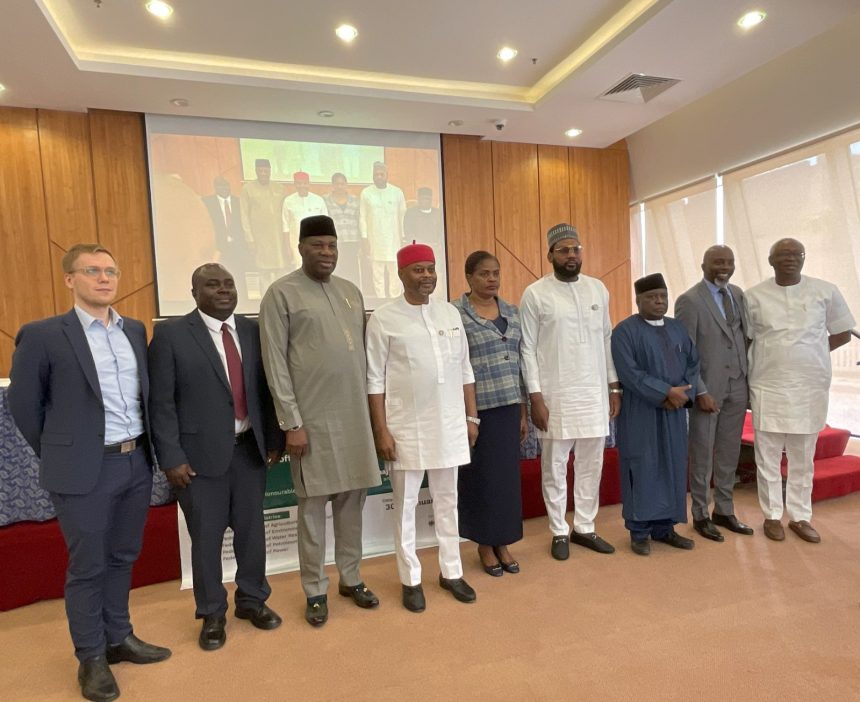By Grace Semudara
Nigeria has taken a major step aimed at adopting Green Hydrogen for diverse usage in the country, beginning with the production of fertilizers.
This is to be executed under the NIGERIA4H2, a project funded by the Federal Ministry of Education and Research (BMBF), Germany through the West African Science Service Centre on Climate Change and Adapted Land Use (WASCAL) to conduct a critical analysis of the potentials, infrastructure and other enabling framework conditions for Green Hydrogen to Fertilizer Production in Nigeria.
The project, officially commenced on Tuesday with the kick-off meeting and stakeholders’ interaction in Abuja.
Nigeria is aiming to take a substantial share of the global hydrogen market for which the demand has been projected to climax at about 700 million metric tons (MT) by the year 2050, with annual hydrogen production projected to increase by 9.2% annually until 2030.
Nigeria’s Minister of Innovation, Science and Technology, Uche Nnaji, in his remarks during the meeting disclosed that exploiting Nigeria’s green hydrogen potential is at the heart of the Renewed Hope Agenda of our dear President Bola Ahmed Tinubu, as seen in the supportive policies that he has introduced since the beginning of his administration.
Speaking on the gains Nigeria could make from investing in Green Hydrogen, the minister said, Green Hydrogen produced from renewable power sources is climate-friendly and address the detrimental impacts of climate change occasioned by the release of greenhouse gases from fossil fuels into the environment while also serving as viable and sustainable pathways for alternative energy generation, industrial development, environmentally friendly transport fuel, methanol production, fertilizer production among other economic uses.
He added that Nigeria enjoys abundant sunshine, with an average of 11 hours of sun daily, a immense solar radiation potential to power electrolyzers for hydrogen production which makes Nigeria a critical stakeholder in the world energy transition.
“The application of green hydrogen in fertilizer production is fast gaining attention globally. Ammonia, made from hydrogen, is also an input in urea fertilizer. This opportunity presents a significant step towards sustainable agriculture. Ammonia, synthesized from green hydrogen and nitrogen from the air, provides an eco-friendly alternative to conventional fertilizers,” Nnaji said.
According to him, reducing reliance on fossil fuels and minimizing greenhouse gas emissions can safeguard the environment while ensuring food security for future generations.
“The concerted efforts of scientists, engineers, policymakers, and industries are necessary to achieve the tall vision of a net zero carbon environment and sustainable agriculture.
“With our Ministry’s renewed drive to attract and mainstream frontier technology that will drive industrial growth and propel Nigeria toward becoming a One-trillion-dollar economy, we must explore new sources and advance in Science and Technology. Thus, we are partnering with the consortia as a service ministry to connect all stakeholders in the hydrogen sector’s upstream, midstream, and downstream sectors,” the minister said.
He added that his ministry intends to facilitate an environment for co-development of a national policy framework for Green Hydrogen by all stakeholders to ensure the sector’s rapid, robust, and all-inclusive development.
“I believe at the end of this meeting, all the stakeholders would have jointly identified and situated the expected players in the emergent hydrogen industry value chain in Nigeria, as well as the critical technical, environmental and policy framework for the exploitation of the Green Hydrogen potential of Nigeria.” The Minister said.
On his part, the Minister of State Petroleum Resources (Gas) Rt.Hon Ekperikpe Ekpo analyzed the potentials, infrastructure and other enabling framework conditions for Green Hydrogen in Nigeria.
The minister who was represented by the Permanent Secretary, Ambassador Nicholas Ella, highlighted the need for collaboration between the green hydrogen and the existing oil and gas sector in advancing Nigeria industrialization.
“In Nigeria, we have embraced our gas resources as our transition fuel aligning with our vision to declare 2021-2030 as the decade of gas in Nigeria, with proven gas reserve of 208 trillion cubic feet (TCF) and implementation of appropriate policies and regulation of these resources, Nigeria stands poised to emerge an industrialised nation,” he said.
According to him, the job opportunities in green hydrogen are huge and important, adding, “When we are sure that the right policies are in place and an enabling environment to drive the policies by 2030, you will be amazed what the green hydrogen will be contributing into the Nigeria’s energy transition plan.”
Head of the German-Nigeria Hydrogen office Ms Gina Lagunes, while making reference to the results of report conducted on Green Hydrogen in Nigeria urged for concerted efforts by all stakeholders for the development of an enabling framework for hydrogen.
Lagunes said the process of finalising a study on policy regulation framework for hydrogen in Nigeria has spur up interest in energy development.
“We are carrying out a study on hydrogen potential for the country (Nigeria) and we are also committed to establishing a working group on development of national hydrogen strategy,” she said.





